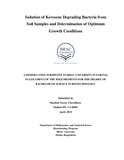| dc.description.abstract | Oil spills are global catastrophes transpiring annually from minute to substantial amounts, threatening the lives of plants, animals and the health of human. Current physical and chemical management systems are very costly and less efficient. Bioremediation through utilization of oil-degrading bacteria proves to be our auspicious hope for the future. Kerosene is a mixture of hydrocarbons that is deployed in aviation fuels and contributes to extremely noxious pollution during spills. It is a conglomerate of benzene, toluene, ethylbenzene, xylene, along with high percentage of aromatic hydrocarbons that are carcinogenic. This makes kerosene imperative to be removed from the environment before its significant spread over large habitat. In this study, several bacterial isolates from four soil samples were assessed for their ability to degrade kerosene. They were grown on mineral salts broth for 7 days at 35°C in the absence of any carbon source apart from kerosene. Growth of the isolates were observed by visible turbidity and evaluated by CFU/mL on mineral salts agar. The isolates were identified as Nocardia, Corynebacterium, Bacillus, Pseudomonas and Arthrobacter through morphological characteristics and biochemical tests. The best potential isolate was tested for its optimum concentration of kerosene, optimum pH for growth and optimum concentration of ammonium sulfate (nitrogen source) requirement. Pseudomonas sp. exhibited to be the most promising amongst the isolated microbes at utilizing kerosene, followed by Bacillus sp., both of which were isolated from soils that were previously contaminated by oil. Isolates such as Nocardia and Corynebacterium taken from soil sample dearth of prior exposure to oil contamination were unable to grow in the presence of kerosene. Pseudomonas sp. tolerated kerosene at concentration as high as 6%, and showed optimum growth at 3% kerosene (v/v). Pseudomonas sp. was also found to grow best at near neutral pH and at nitrogen concentrations (ammonium sulfate) of 1 g/L. | en_US |

